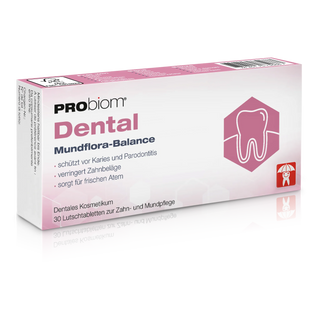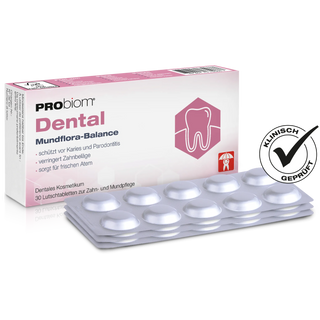The oral cavity is much more than just a part of the digestive system - it plays a central role in our overall health. A balanced oral flora, i.e. a balance of microorganisms in the mouth, is crucial for oral health and also contributes to general health. Imbalances in this oral flora, on the other hand, can lead to numerous problems, from tooth decay and gum disease to systemic diseases such as diabetes and cardiovascular disease. In this blog post, we look at why a balanced oral flora is so important, which factors influence it, and what we can do to ensure a healthy oral flora.
What is oral flora and why is it so important?
The oral flora, also known as the oral microbiome, refers to the totality of microorganisms found in the oral cavity. These bacteria, fungi and viruses form a complex ecosystem that lives in symbiosis with our body. A healthy mouth is home to hundreds of species of bacteria that play an important role in protection against infections, in the utilization of food and in the immune system.
The oral flora is of fundamental importance for several reasons:
- Protection against pathogens : The "good" bacteria in the oral flora prevent pathogenic germs from settling and spreading. They therefore act as the first line of defense and contribute to the immune system.
- Maintaining dental health : A balanced oral flora reduces the risk of tooth decay and gingivitis because it keeps acid-producing bacteria and pathogens that cause inflammation in check.
- Impact on general well-being : There is increasing evidence that healthy oral flora supports the health of the entire body, while disturbed oral flora can increase the risk of systemic diseases.
Causes and risk factors for a disturbed oral flora
A variety of factors can disrupt the balance of the oral flora. The most common reasons are:
- Diet : Sugary and highly processed foods promote the growth of acid-producing bacteria such as Streptococcus mutans , which can attack tooth enamel and cause tooth decay. A lack of certain nutrients can also negatively affect the oral flora.
- Poor oral hygiene : Inadequate dental care leads to the formation of plaque, a breeding ground for harmful bacteria that can lead to gingivitis and tooth decay.
- Medications : Antibiotics, mouthwashes containing alcohol and other medications can disrupt the balance of oral flora by killing not only harmful but also beneficial bacteria.
- Smoking and alcohol : Smoking and excessive alcohol consumption have a negative effect on the oral flora and increase the risk of gum disease and oral cancer.
- Stress and hormonal changes : Psychological stress, hormonal changes during puberty, pregnancy or menopause can also affect the oral flora because they weaken the immune system.
The consequences of a disturbed oral flora
Dysbiosis, i.e. an imbalance of microorganisms in the mouth, can have a variety of effects and affect both oral and general health.
caries and gum disease
Tooth decay and periodontitis are among the most common consequences of a disturbed oral flora. Excessive colonization of acid-producing bacteria attacks tooth enamel, which leads to tooth decay. In the case of gum disease, inflammatory bacteria settle in the gum pockets and cause inflammation, bleeding gums and, in advanced stages, even tooth loss.
bad breath
An imbalance in the oral flora can also lead to unpleasant bad breath. Certain types of bacteria in particular produce sulfur-containing compounds that lead to an unpleasant smell.
effects on general health
Numerous studies have shown that a disturbed oral flora can promote systemic inflammation in the body. Bacteria from the oral cavity can enter the bloodstream and thus increase the risk of various diseases, such as:
- Cardiovascular diseases : Chronic gum inflammation increases the risk of heart attacks and strokes because inflammatory bacteria can damage the vascular system.
- Diabetes : Patients with diabetes are at higher risk for gum disease, and conversely, periodontal disease can make blood sugar control more difficult.
- Respiratory diseases : Bacteria from the oral cavity can also enter the respiratory tract and cause infections such as pneumonia.
How can we promote healthy oral flora?
Fortunately, there are many ways to keep the oral flora healthy and thus support oral and general health.
Proper oral hygiene
Regularly brushing your teeth with fluoride toothpaste, cleaning between your teeth with dental floss or interdental brushes, and using mild mouthwashes can help control harmful bacteria and prevent plaque buildup.
Nutrition
A balanced diet low in sugar and processed foods is crucial for healthy oral flora. Certain foods such as dairy products that contain probiotics can even help promote the balance of oral flora. Fruits and vegetables that are rich in fiber and vitamins also support healthy oral flora by strengthening the gums and stimulating saliva production.
Probiotics for the oral flora
Similar to the intestinal flora, there are also probiotic products for the oral flora that contain beneficial bacteria and can strengthen the microbiome in the mouth. Streptococcus salivarius M18 in particular has been shown in studies to be helpful in reducing the risk of bad breath, tooth decay, gingivitis and periodontitis, or in building up effective protection in the oral flora.
stress reduction and sufficient sleep
Reducing stress and getting good quality sleep can also contribute to oral health by strengthening the immune system and increasing the body's resistance to inflammation.
Avoiding smoke and alcohol
Anyone who values healthy oral flora should avoid consuming tobacco and alcohol. Smoking impairs blood circulation in the mouth and encourages the growth of harmful bacteria. Mouthwashes containing alcohol should also be avoided, as they often dry out the oral mucosa and can lead to an imbalance in the oral flora.
Future of Oral Health: Individualized Care Concepts and Research
Science is discovering more and more about the role of the oral microbiome and its influence on health. In the future, it may be possible to develop oral care products that are specifically tailored to the individual's microbiome. These products could specifically promote beneficial bacteria and inhibit disease-causing germs. The use of probiotic preparations for oral care could also become more established, as more and more studies confirm their benefits for oral flora and general health.
Conclusion
A balanced oral flora is the foundation for good oral health and protects us from infections and inflammation. Through conscious dental care, a healthy diet, avoiding harmful influences such as smoking and alcohol and the use of probiotics, we can promote the balance in the microbiome of our mouth and stay healthy in the long term. Oral health is much more than just a question of tooth enamel; it is an essential factor for overall well-being and our quality of life.















